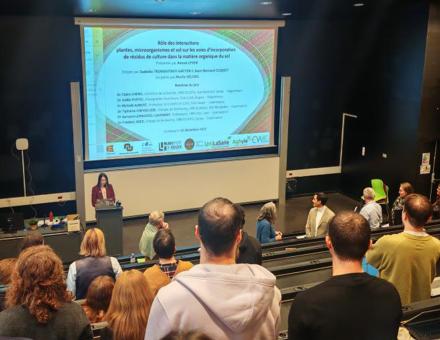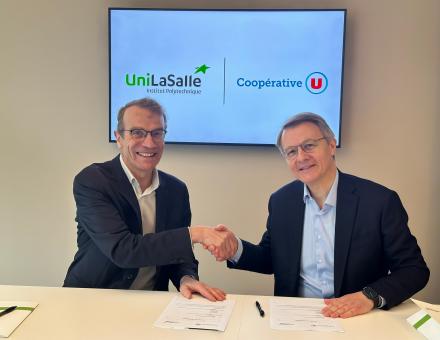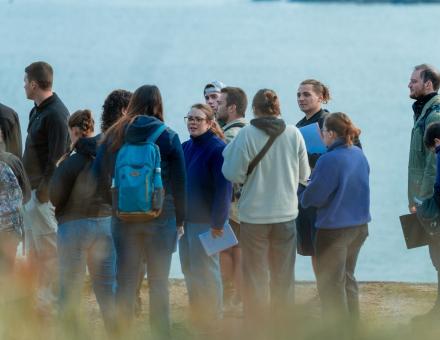Congratulations to Charlotte for her thesis on the optimization of nitrogen and phosphorus nutrition of rapeseed for a sustainable production via the use of biointrants improving the functioning of the phytobiome.
Charlotte Amy, a PhD student working in the Agro-ecology, Hydrogeochemistry, Environments & Resources research unit (AGHYLE - UP 2018.C101) of UniLaSalle, validated her PhD thesis following her thesis defense on Friday, December 17, 2021, which took place in Caen.
His work concerned the "optimization of nitrogen and phosphorus nutrition of rapeseed for a sustainable production via the use of biointrants improving the functioning of the phytobiome".
The whole UniLaSalle team congratulates Charlotte for obtaining her thesis!
The members of the jury :
Mrs Claude Plassard, Research Director (Rapporteur), UMR INRAe Eco&Sol Campus SupAgro Montpellier Mr Alain Mollier, HDR Research Associate (Rapporteur), UMR INRAe ISPA, Bordeaux
M Stéphane Uroz, Research Director (Examiner), UMR INRAe IAM, Nancy
Mrs Marie-Pascale Prud'homme, Professor (Examiner), UMR INRAe EVA, Caen
M Jean-Christophe Avice, Professor (Thesis Director), UMR INRAe EVA, Caen
Mrs Karine Laval, Research Director (Thesis Director), Aghyle Unit, UniLaSalle Campus Rouen
Mrs. Mélanie Bressan, Research Associate (Supervisor), Unité Aghyle, UniLaSalle Campus Rouen
Abstract:
Oilseed rape is a nitrogen (N) and phosphorus (P) demanding oilseed crop but is characterized by a low N use efficiency (NUE), mainly related to a poor remobilization of N from source organs to growing sink organs. As these recycling mechanisms are ATP-dependent, an improvement of P nutritional conditions is likely to improve the agronomic performance of rapeseed with respect to N supply. P is poorly available in the soil solution and could be made more accessible for plant nutrition through the use of P solubilizing microorganisms (Phosphate-Solubilizing Bacteria or PSB). Already deployed in the field, these solutions, more respectful of the environment, are nevertheless not very efficient. In this context, the objectives of this thesis are to study under controlled conditions the impact of different N and P fertilization strategies (i) on the agronomic performance of oilseed rape, yield and seed quality, (ii) on the ability of plants and PSBs isolated from Normandy soils to interact to stimulate plant growth and (iii) to characterize the clean and allelopathic effects of the introduction of an allochthonous PSB microorganism in a new environment linked to an improvement of oilseed rape growth (cv. Aviso). This study showed that an adjustment of the N and P fertilization ratio allowing to lower N inputs can lead to an optimization of the N and P use efficiency, without penalizing the yield and the quality criteria. It also appears that cultural practices impacting the N and P status of the plants at the end of the vegetative stage would make it possible to pilot the crop in an early manner to modify the quality of the seed and direct it towards the vegetable oil or protein sectors. The availability of P was improved by the application of the bacterial strain F23 (of the genus Pseudomonas) isolated under the cover of faba bean by our care. Indeed, in soil culture, the application of this strain allowed to decrease by 50% the P fertilization. The metagenomic analysis performed on the microbial communities associated with the rapeseed root environment also showed an increase in the relative abundance of bacterial genera involved in the biogeochemical cycles of nutrients as well as a decrease of genera related to the control of telluric pathogens, indicating a change in specialization of the microbiota. Finally, when tested under axenic conditions, strain F23 confirmed its potential to improve plant growth when the available N level is not limiting. All these results reveal the benefits of using innovative practices for reasoning N and P fertilization and the potential of bioinputs to improve the agro-environmental performance of rapeseed in an ecological engineering approach.







